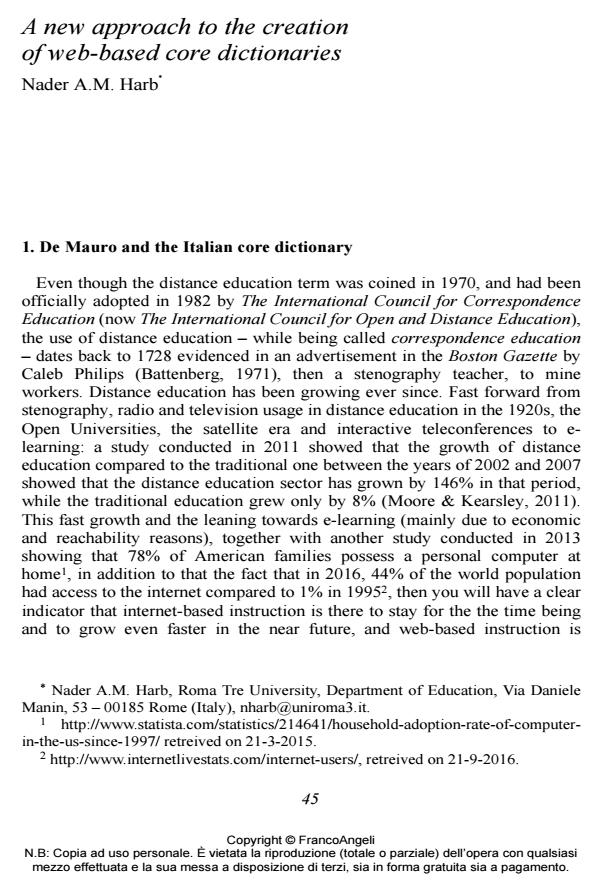A new approach to the creation of web-based core dictionaries
Titolo Rivista CADMO
Autori/Curatori Nader A.M. Harb
Anno di pubblicazione 2017 Fascicolo 2016/2 Lingua Inglese
Numero pagine 12 P. 45-56 Dimensione file 405 KB
DOI 10.3280/CAD2016-002005
Il DOI è il codice a barre della proprietà intellettuale: per saperne di più
clicca qui
Qui sotto puoi vedere in anteprima la prima pagina di questo articolo.
Se questo articolo ti interessa, lo puoi acquistare (e scaricare in formato pdf) seguendo le facili indicazioni per acquistare il download credit. Acquista Download Credits per scaricare questo Articolo in formato PDF

FrancoAngeli è membro della Publishers International Linking Association, Inc (PILA)associazione indipendente e non profit per facilitare (attraverso i servizi tecnologici implementati da CrossRef.org) l’accesso degli studiosi ai contenuti digitali nelle pubblicazioni professionali e scientifiche
Reading is one of the basic skills in learning, and often it represents one of the main skills required in distance learning courses. That being said, one of the most important characteristics of distance education is the construction and the design of the learning message offered to learners during a distance learning course (Agrusti & Vertecchi, 2007). The present article focuses on Italian core dictionary, examining some known algorithms and approaches used by Tullio De Mauro in the creation of the Italian core dictionary and adapting it to a larger, yet less reliable, context: The World Wide Web. This synopsis will present a brief summary of the approaches adopted in order to identify the data of interest, data collection, filtering and in the end an assessment of viability and reliability of the newly created dictionary (Web-based core dictionary). All this in order to keep up with the effects the rapid advances of technology, globalization and connectivity have, not only on our life style, but also on our spoken and written language on a daily manner (Downes, 2008). This research shows how little the useable data is, in analogy to bulks of Big Data collected from the internet, the need to be careful in the adoption of new words and the need to adopt new approaches regarding the creation of a web-based core dictionary, as well as the need to consider new elements to refine the end product.
Keywords:Distance education, web-based basic vocabulary, core dictionaries, web crawling, Big Data, Internet.
- Agren, O. (2006), “Assessment of WWW-based Ranking Systems for Smaller Web Sites”, INFOCOMP Journal of Computer Science, 5 (2), pp. 45-55.
- Agrusti, F., Vertecchi, B. (2007), “TestMaker. Un programma per misurare la capacità di comprensione della lettura”, Cadmo Giornale Italiano di Pedagogia sperimentale. An International Journal of Educational Research, 1, pp. 118-121.
- Battenberg, R.W. (1971), “The Boston Gazette. March 20, 1728”, Epistolodidaktika, 1, pp. 44-45.
- De Mauro, T., Osuchowska, I., Pierangeli, L. (1980), Guida all'uso delle parole. Roma: Editori Riuniti, pp. 162-166
- Downes, S. (2008), “Places to go: Connectivism & Connective Knowledge”, Innovate: Journal of Online Education, 5 (1), p. 6.
- Hundt, M., Nesselhauf, N., Biewer, C. (eds) (2007), Corpus Linguistics and the Web. Amsterdam-New York: Rodopi.
- Kennedy, J. (2014), “Characteristics of Massive Open Online Courses (MOOCs): A Research Review, 2009-2012”, Journal of Interactive Online Learning, 13 (1), pp. 1-15.
- Kilgarriff, A., Grefenstette, G. (2003), “Introduction to the Special Issue on the Web as Corpus”, Computational Linguistics, 29 (3), pp. 333-347.
- Moore, M., Kearsley, G. (2011), Distance Education: A Systems View of Online Learning. Belmont, CA: Wadsworth Cengage Learning.
- Ueyama, M. (2006), “Evaluation of Japanese Web-based Reference Corpora: Effects of Seed Selection and Time Interval”, in M. Baroni, S. Bernardini (eds), Wacky! Working papers on the Web as Corpus, Bologna: Gedit, pp. 99-126.
- Vardi, M.Y. (2012), “Will MOOCs destroy Academia?”, Commun. ACM, 55 (11), p. 5.
Nader A.M. Harb, A new approach to the creation of web-based core dictionaries in "CADMO" 2/2016, pp 45-56, DOI: 10.3280/CAD2016-002005